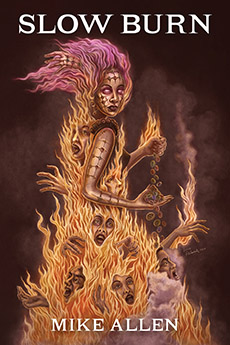Featured Poem IV • April 2018
Glut of Norths: A Purgatory
John Philip Johnson
with thanks to John Sexton
Ghosts of horses stood asleep in fields of long grass and thistle. Moonlight filled them with a glimmering. Rocks in the field were a grey, dull shine. A man, made of moonlight, awoke in the grass, woven together out of sputtering breath, a breath like jasmine, like perfume from a life. He stared into the formless, cloudless grey sky. He sat up, with vertigo, with no understanding. The horses stirred. They snorted, softly stamping misty hooves on ground that gave way like pooled dreams. For no reason that he knew, he floated to them with steps that were suggestions of steps, swinging legs like weighted limbs of fog, his body a swirl of possibilities that wouldn’t coalesce into flesh. He put a vague hand on a horse’s neck, an Andalusian like his own. The idea came to him he needed to ride. He swung the dead weight of the approximation of his leg over the bare back; part of him flung away into the mist around them, but recovering, re-growing like a cloud. He tried to let his thighs feel the horse’s flanks, tried to dig the impression of his heels into the horse’s ribs, tried to grab the mane and give a voice to make the thing move, but nothing. Nothing came. He was nothing. Then suddenly, the horse flew, and they plunged into confusion, across a featureless terrain, amid a glut of small norths. They hurled themselves, yearning, bodiless, seeking form, chasing flesh, chasing the endless retreat of solid morning and the distant, lost abstraction of a star.
 John Philip Johnson has had poems and stories in Asimov’s Science Fiction, Fantasy & Science Fiction, Strange Horizons, Rattle, Apex Magazine, Phantom Drift, Daily Science Fiction, and elsewhere, including Ted Kooser’s newspaper column, “American Life in Poetry,” and at the Poetry Foundation. He is working on a new comic book of graphic poetry with Marvel Comics legend Bob Hall and others. He would love to go to Mars if his wife would come with him.
John Philip Johnson has had poems and stories in Asimov’s Science Fiction, Fantasy & Science Fiction, Strange Horizons, Rattle, Apex Magazine, Phantom Drift, Daily Science Fiction, and elsewhere, including Ted Kooser’s newspaper column, “American Life in Poetry,” and at the Poetry Foundation. He is working on a new comic book of graphic poetry with Marvel Comics legend Bob Hall and others. He would love to go to Mars if his wife would come with him.
He writes that “Glut of Norths” was “inspired by John Sexton’s ‘False North.’ I liked the ideas in the poem, and while I think Sexton is one of the very best in this field, each of us does things differently. I want most in a poem to give the reader an eidetic experience, letting tangible nouns do the feelings and philosophy. This poem was my attempt to pile on enough spectral imagery that one could get a feel for it, and the lostness here was kinda sorta the disorientation we have in this Deleuzian century that surrounds us, with all of its false norths.”
![]()
If you’ve enjoyed what you’ve read, please consider pitching in to keep us going. Your donation goes toward future content.
![]()















